► How to buy a second hand plug-in hybrid car
► The best used PHEVs, in all shapes and sizes
► Find out if a plug-in hybrid is right for you
Legislation aside, consumers are embracing electrification of transport. 2022’s car sales figures saw EVs leap forward 40% year-on-year, with over quarter of a million new electric cars joining Britain’s roads. Yet, for many lifestyles the plug-in hybrid car offers the most appropriate, pragmatic solution to the compromises a battery electric vehicle (BEV) can require.
Plug-in hybrids offer a choice of environmental and financial benefits, encompassing some of the appeal of electric cars: reduced local exhaust emissions as most PHEVs can cover 20-40 mile round trips without troubling their combustion engines, lower costs (compared to petrol or diesel) as a company car, and often, exemption from charges in Clean Air zones – at least, for now.
In addition, the engine and brakes frequently last longer, due to the dual-purpose nature of the electric motor.
Not everything is a saving over pure combustion models, though – if you don’t plug your plug-in in, it’s likely that it will be less economical at the pumps than the diesel or ‘self-charging’ hybrid alternative. If you’re relying on on-street parking and paid-for public chargers a PHEV is of little benefit financially.
Should I buy a used plug-in hybrid?
We buy used cars all the time, but it’s understandable there are more questions attached when they come with a hybrid powertrain. Thankfully, it turns out that hybrids and PHEVs – like their EV counterparts – can be less demanding on common wear-and-tear items.
CVT gearboxes, optimised and less frequent engine use (with the additional limitation that it’s very hard to abuse the engine or transmission thanks to drive-by-wire boundaries), and regenerative braking mean component wear is slower than on conventional cars. Specialists can repair battery packs, and firms like Toyota are looking after their self-charging hybrid buyers with transferable extended warranties and fixed-price repairs, keen to ensure the next generation of hybrid owners aren’t scared off.
If you want to look at good-value new hybrid cars, check out our advice here.
The top 10 best used plug-in hybrids
To reflect the variety of models on the market, we’ve chosen the best five plug-in hybrid SUVs you’ll find second hand, and the best five plug-in hybrid cars. It’s a competitive market segment, so we’ve focused on how effective they are overall within the expectations of the kind of vehicle they are; if there are credible alternatives that might suit different tastes, they get a mention as well.
Availability is important, so while recent models are genuinely capable, impressive vehicles, the chances are you’ll struggle to find stock at a price that’s better than financing a new model. It’s worth checking our guide to the best hybrid cars of 2023, then focusing on nearly-new or dealer stock, if you’ve got a higher budget but don’t want to wait for delivery of a new order.
Five PHEV SUVs: plug-in mud-plugging, green commuting
Big 4x4s got a reputation for being a bit obnoxious when they decided to settle down in more urban environments; the issue is, once one family car looks bigger and stronger than the others, everyone wants one. These days they’re just another bodystyle for the same engineering, often losing the 4×4 and ‘toughness’ entirely.
However, this is where the plug-in hybrid first showed its potential; using separate motors per axle allows simple, economical, and more reliable all-wheel drive, restoring that ability. There’s room to hide the batteries, and electric power’s instant low-down torque suits towing (though few older PHEVs can tow a meaningful amount), off-road exploits, and CO2 reduction in built-up areas.
5. Mitsubishi Outlander PHEV (2014-)
- Used price: from £10,000 (£16,000 2.4-litre)
- The original PHEV and still capable, but 2018-on models are best
For years, the Mitsubishi Outlander was an outlier in the world of all-wheel drive SUVs. Sometimes masquerading as a Citroën or Peugeot, the sensible, capable Mitsubishi lacked the spark that draws new audiences to showrooms.
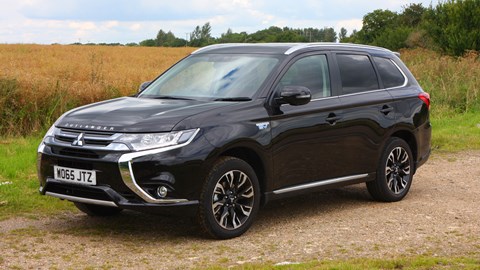
Until 2014, when it got a spark (and a significant tax advantage) that made it the go-to hybrid for buyers wanting a tall, practical car. As one of the first plug-in hybrids, introducing SUV buyers to the word ‘PHEV’ and delivering 31 miles of fuel-free range, it softened the image of urban all-wheel drive, off-roader drivers and took full advantage of early green incentives, selling in significant numbers.
All models share user-friendly controls, and a rather dull, but unintimidating interior rather than ‘futuristic techno showcase’; any driver will feel at home in a used Outlander PHEV. Post-2015 facelift models have nicer trim, but we recommend looking for the 2.4-litre, upgraded model introduced in 2018 – it’s just better in every respect.
Ride comfort is good in and out of town, and the Outlander handles surprisingly well for a high-riding SUV. Decent kit levels are available, too, though nothing too plush. Wrapping up cutting-edge running gear in a conservative package is a winning combination, clearly.
CAR verdict: ‘Mitsubishi found what Britain’s drivers want in a plug-in hybrid, and the Outlander is a best-seller as a result; deservedly so. Restrained styling underlines the substance, rather virtue signalling’
4. Vauxhall Grandland X Hybrid and Hybrid4
- Used price from £22,000
- Vauxhall’s most powerful car since the VXR8/Lotus Carlton era
This is not the first fruit of Vauxhall’s incorporation into the epic group of manufacturers now known as Stellantis, but the Vauxhall Grandland showed what Vauxhall could become, after the rather uninspiring Crossland. After a facelift it dropped the X, and in current GSE form is rather good value for a new AWD SUV with almost 300bhp to play with.
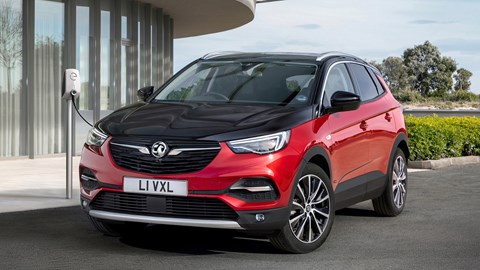
Sharing technology and a platform with the Peugeot 5008, 3008 and DS 7 Crossback, the Grandland X (the X was dropped after a facelift) Hybrid4 has 296bhp, all-wheel drive and a 5.9-second 0-62 time, yet in our long-term test returned 65.4mpg.
That’s down to the chunky battery, which yields a claimed 31 miles of EV range. There is a lower-power, front-wheel drive version as well, but the appeal of the Grandland Hybrid4 is that all-wheel drive and impressive on-paper performance. The only reason it’s in fourth place is that the performance really is ‘on-paper’ – on road, it’s nothing like as exciting or as useful as you’d hope from a car with more power than a GTC VXR.
But tantalisingly low used prices, ample passenger space, and the potential for low running costs mean it makes the list; its Peugeot, Citroen and DS siblings don’t due to rarity and high residuals.
CAR verdict: ‘The Vauxhall Grandland hybrid sounds like the best sleeper since the Zafira GSi Turbo. Unfortunately, the way it uses that 296bhp is an effective cure for insomnia’.
3. Range Rover P400e (2018-)
- Used price: from £50,000+
- Impressive, imposing, but monthly finance could equal buying new
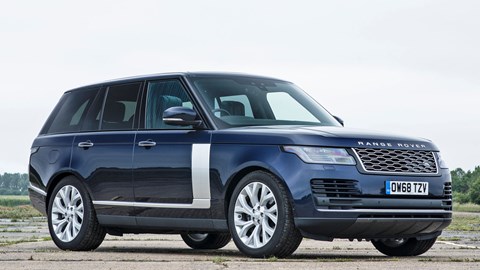
What’s better than a Range Rover? A Range Rover that can claim 101mpg and qualify for lower BIK. The fourth generation L405 P400e takes the already imposing bulk of Land Rover’s finest, and swaps the thirsty V8 for a 2.0-litre petrol Ingenium engine. Oh, and 300kg of batteries and electric motor.
If that seems counter-intuitive, given the already impressive mass of the regular version, it’s worth noting that said 2.0-litre engine is putting out 296bhp, and feeding into an eight-speed automatic gearbox. Integrated into the transmission is an 85kW motor, boosting torque and providing up to 31 miles of battery-powered range.
With that combination the Range Rover P400e is fast – V8 fast – yet claims 101mpg and 64g/km emissions, along with all the tax advantages that implies. Yes, it’s lost the character of the V8, and weighs as much as the previous generation, but it’s smooth and unbelievably luxurious (Executive Class Seating is a must). Off-road ability remains unaffected, as well. Take time when buying, as second hand examples may have just the right bespoke spec which would bump up the new cost considerably, but makes little difference to used values.
The strongest argument against a used L405 P400e is the current, fifth generation Range Rover. Financing a £50,000 five-year-old used car is expensive, it’s likely to need repairs during the finance term, and, the monthly payments might be the same for a new one. The 2022-on L460 is a big upgrade in all regards.
CAR verdict: ‘It’s the most sensible Range Rover yet, and the P400e makes more sense in the full-fat Rangie rather than the Sport where the V8’s soundtrack is hard to ignore’
2. Mini Countryman Cooper S E ALL4
- Used price: from £16,000
- Capable, quick and stylish – if a little small
Get past the comments about ‘it’s too big to be mini’, and the Mini Countryman is simply a pleasant to drive small family SUV with handling that reflects the brand’s sense of fun (and BMW connections). Add the all-wheel drive ability of ALL4, and the spice of Cooper S performance justified by a sub-7.0 second 0-62mph, and the plug-in’s appeal goes beyond just 26 miles of electric range.
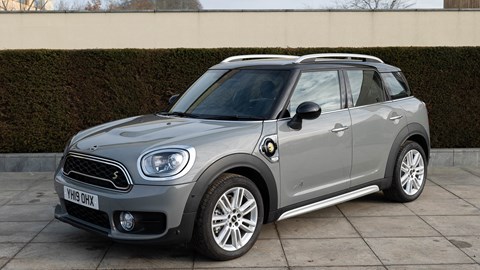
It’s this high in the ranking because of the price, however. New buyers have plenty of alternatives, such as Kia and Hyundai’s recent small SUVs, but at this budget you won’t get as much character, or such a pleasing experience behind the wheel. The styling is distinctive, the build quality and equipment levels generally high (though a lot is optional, of course), and you’ll find lower mileage four-year old examples for less than the cost of all but the cheapest new cars.
As always, take time to shop around as the Countryman has a lot of personalisation and option packs, meaning more choice than just silver with black interior.
CAR verdict: ‘Consumer catnip thanks to its SUV bodystyle and trendy plug-in powertrain, it’s also surprisingly fun to drive. As a used PHEV, the Countryman offers good value for money and accessible style’
1. Toyota RAV4 PHEV
- Used price: from £38,000
- It’s more of a nearly-new than used, but one of the best
Toyota are masters of the self-charging hybrid, but plug-ins took them a little longer to design. Transforming the RAV4 into a full-fledged PHEV means a chunky 2.5-litre four-cylinder engine, big 17kWh battery, and all-wheel drive. The usual 300+bhp and ‘80s supercar acceleration are a given, but what transforms the RAV4 isn’t the pace, it’s the grace.
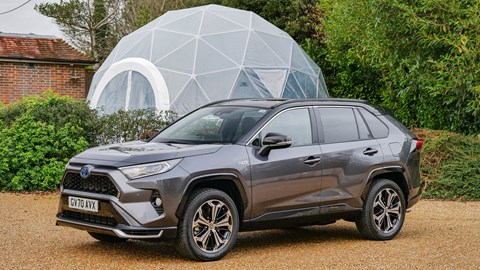
In creating the plug-in Toyota added acoustically-insulated glass, extra sound insulation, and a completely different behaviour for the gearbox that for most drivers means the CVT ‘mooo’ of high-revs at work is a thing of the past. It’s not thrilling to drive, but it’s predictable with good feedback and good manners; an enthusiastically-driven RAV4 PHEV can cover ground very quickly. It’s not completely tethered to the road, either; although it uses an e-motor and rear axle it has a proper off-road setting with various drive modes.
What it does brilliantly is substitute for an electric car. Its claimed (and BIK-friendly) 46-mile range is achievable by typical drivers in summer. It also uses the hybrid system during longer drives to great effect, yielding around 46mpg without ever visiting a plug. Not bad for a 4×4 SUV of this size and performance: it’s the only PHEV we’d buy without the option of plugging in between drives.
Buying used is the only way to get a RAV4 PHEV quickly, it’s so new to the market – but it’s also one to watch for the future, particularly with Toyota’s ten-year/100,000 mile warranty scheme.
CAR verdict ‘From the original GTI-chasing small 4×4 to the latest efficient hybrid, Toyota’s RAV4 continues to set the tone for the genre; as a plug-in it’s not cheap – but it’s effective, with more substance than mere virtue signalling bling’
Five plug-in hybrid family cars: a perfect, plugged-in compromise
A few years ago the plug-in hybrid car made little sense next to a diesel, for new buyers – but then company car tax rules ditched derv, and having some electric range could save a lot when it comes to benefit-in-kind. There’s a varied selection of used plug-in hybrid cars available now and they can be extremely effective.
Almost all of these cars offer a bridge between the economy of the smallest engine/lowest power option and the performance of the hot-hatch or similar equivalent, with that eco-friendly EV mode for short trips as well. The only caveat when buying a plug-in hybrid car is to check the specs carefully, as they often lose boot space or practicality to fit the batteries in.
5. BMW 225xe ActiveTourer (2016-)
- Used price: from £17,500
- BMW’s answer to the S-Max, but who asked the question?
This is how to do hybrid, premium and family car well. Okay, the 225xe ActiveTourer isn’t cheap, and BMW enthusiasts may still be taking offence at the front-wheel drive platform and slightly odd proportions, but the space, refinement, interior design and polish are all present. Like the i8, there’s a turbocharged three-cylinder engine – though it’s only producing 134bhp, supplemented by an electric motor with another 84bhp.
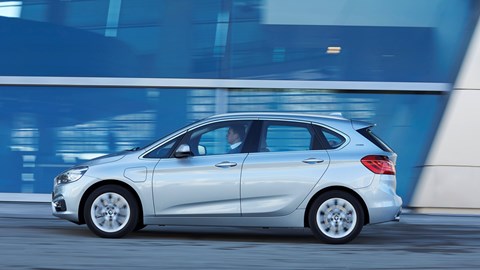
The original 225xe has sufficient battery capacity to travel 24 miles or so without a sip of petrol and can be fully charged from a domestic socket in a little over 3 hours, making urban commutes without local emissions a real possibility.
In true BMW fashion, the options list is extensive (and expensive, new). Take your time when buying and you could get a lot of extra value, as options don’t add much to the residuals. Also true to BMW’s brand, the 225xe is a practical people-mover that can shift; 62mph is achieved in less than 7 seconds. It doesn’t handle like a BMW though. It’s good for the class, but still a little soft and vague compared to the sharpest 3 Series. And if that’s a problem, there’s a 3-series hybrid too.
CAR verdict: ‘BMW’s take on the hybrid family MPV really is very effective. If it drove more like a 2-series, it’d be perfect – slightly awkward looks aside’
4. VW Golf GTE (2015-2017)
- Used price: from £13,500
- The GT part gives 90s performance, the E hunting for dealers
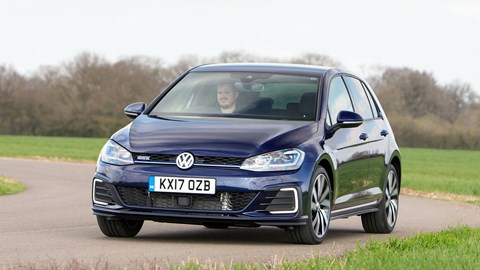
If the Volkswagen Golf is the template for the optimum family car, then the Golf GTE must surely be the optimum hybrid? A plug-in hybrid with a combined power output of 200hp from a 1.4-litre TSI engine and an 8.7kWh battery feeding the obligatory electric motor, the front-wheel drive Golf is heavier than a GTI, but keeps some of the sharp handling and if anything, an even more planted feel thanks to the extra kilos tucked under the rear seat.
Fuel economy takes a hit if you can’t plug-in, but still approaches 40mpg in the worst scenarios for a petrol-powered Golf that deserves to be considered a hot hatch, and is one of the best hybrid cars to drive. Manage your power well, and short commutes could be covered entirely on battery.
Volkswagen got it so right with the Golf GTE that it wasn’t long before demand outstripped supply; cynics might have noticed that the technically similar Audi A3 e-Tron continued to be available, with a suitably higher price-tag.
CAR verdict: ‘We wanted one new, and then VW paused sales. Well worth finding a used example – if we don’t get there first’
3. Audi A3 Sportback e-Tron (2015-20)
- Used price: from £13,000
- Small, sporty and popular; cut-price leases mean good used supply
The Audi A3 Sportback e-Tron is the car that you’ll buy after giving up looking for a Volkswagen Golf GTE. Aside from being essentially the same vehicle with a slightly more upmarket feel, it’s the one that was prioritised when VW couldn’t get enough batteries to meet demand.
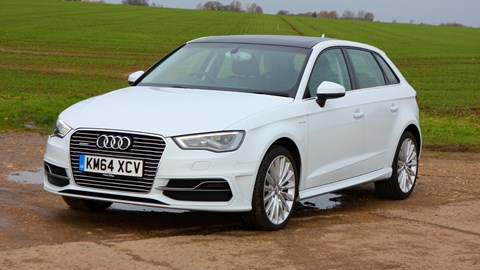
Despite the premium brand – and list price – it was also really cheap on lease right into the first couple of months of lockdown, before 70-plate. That means there are loads of three to five year old examples either about to join, or already in, the used market.
While the electric-only range isn’t massive, and the resulting economy merely comparable to the diesel, it’s a highly effective package. Thanks to a relatively light battery and sensible size of fuel tank, the A3 e-Tron can achieve an impressive range between stops, and the secure handling Audi’s known for isn’t unduly affected.
There’s an unusual gap in the production, but post-2018 facelift models are numerous for £16,000 upwards, albeit with higher miles. If you want a smallish, premium automatic hatchback you’ll struggle to find anything better.
CAR verdict: ‘A sensible approach to hybrid compromises mean the A3 Sportback e-Tron is very easy to live with – and remarkably cheap to run, without diesel’s mucky reputation’
2. Mercedes-Benz C350e Estate (2014-2018)
- Used price: from £10,000
- Versatile, luxurious, and refined, but saloon’s boot is tiny
Mercedes-Benz has a tendency to introduce cutting-edge features on bigger models, but as ‘the baby S-Class’ the C-Class does get a few nice things and designs without waiting too long. The C350e has a relatively small battery of 6.4kWh, but that saves weight – and space.
Not that saloon buyers will appreciate the effort; the four-door plug-in has an astonishingly small compartment (just 335 litres) tacked on to the back, with a very obvious ‘step’ in the floor.
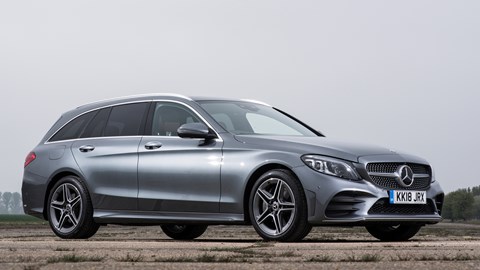
Which is why we specifically recommend the C-Class Estate, as it has a useful luggage area, well-balanced styling and a refined, quality feel yet it’s one of the cheapest plug-in hybrids you can buy second hand. It’s still only 350 litres under the load cover, but fold the seats, and use the height of the tailgate, and you get 1370 litres of carrying capacity. Unusually for a hybrid of this age, it can also tow – 1600kg is not great, but it’s better than many small SUVs. Add the 155mph top speed, and 0-62mph in 5.9 seconds with 50mpg real-world potential, and you see why this could be the diesel substitute you’ve been waiting for.
However, as is so often the way for Mercedes in the UK, reliability does raise concerns. Air suspension is standard and the electrical system is complex. We’d only buy one with a good warranty – or a trusted specialist on hand. The small battery also means a short EV range, but it’s enough for a run to the shops and much kinder than a pure petrol C-Class of similar performance.
CAR verdict: ‘It’s a cheap used hybrid because it inherits Mercedes’ occasionally unreliable tech, such as air suspension – but if you buy well, and know how to look after a 21st century Mercedes, it’s a cut above most things you’ll find for the budget’
1. Kia Optima Sportswagon PHEV (2017-)
- Price used: from £15,000
- Sensible estate is very appealing – once you try it
Kia’s reinvention from budget Korean rebadged Mazdas, to cool, aspirational and distinctive might be defined by the Stinger and Sportage, but the Optima quietly offered a renaissance for the practical, affordable family estate. Drivers daunted by a choice of dull, or premium wagons, or the inescapable flurry of SUVs, could go for a good looking, low estate car in the shape of the Optima Sportswagon.
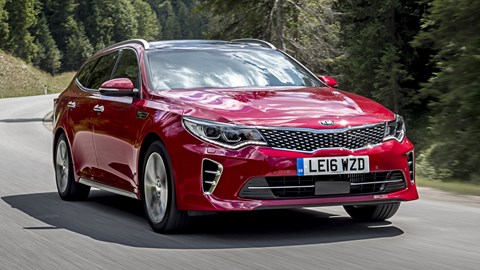
A plug-in hybrid model joined the range in 2017, and the 202hp, 2.0-litre petrol engine plus motor combination breaks with tradition by using a dual-clutch automatic gearbox in place of the typical CVT most hybrids feature. This makes it feel sportier and more natural to drive, but the performance is far from stunning; 62mph takes almost 10 seconds.
Economy claims well in excess of 170mpg may be hard to achieve or believe, but 33g/km CO2 ensures low BIK, and going forward, the pure EV range of around 30 miles count towards the Optima PHEV’s abilities being worth seeking out. Plus, it has a standard seven-year warranty – so most used examples have as much cover remaining as many new cars.
CAR verdict: ‘Kia’s euro-style semiotics prove effective in the Optima Sportswagon – in style and handling. The PHEV loses some finesse. Warranty smoothes out bumps of ownership, even if the suspension less effective at hiding the road’
What makes a plug-in hybrid appealing as a used buy?
For anyone considering a second-hand electric car at the lower end of the market, ‘range anxiety‘ is a valid concern – early models often have smaller batteries as well as the unknown of battery degradation (70% ‘acceptable’ capacity when your range is only 100 miles is quite a hit). PHEVs address that as they not only offer a longer range on fuel + battery, they can be refuelled quickly at a petrol station. Their smaller batteries can be topped up overnight on a domestic plug, too, or at a current that can be fed with a reasonable domestic solar installation.
They’re usually quiet, and smooth to drive as well. For drivers with a two-pedal licence, used to the pitfalls of higher-mileage autos, mainstream PHEVs use the motor(s) for drive as much as possible – meaning the transmission lasts longer and may be more forgiving of the typical ‘overlooked service’ many automatic gearboxes encounter.
Why is a plug-in hybrid better than ICE for short trips?
The warm-up period of say, a local commute, school run or shopping trip is where petrol and diesel models are least efficient, and it takes a long drive to warm the catalytic converter up during which time the car may use excess petrol to speed up the process. Frequent short trips is a primary cause of DPF failure for modern diesels, and as an aside if your drive is less than 10 miles in distance, but at slow speed due to congestion and traffic, a PHEV knocks your typical ‘start-stop’ system into a cocked hat for smoothness.
It’s not just the EV-mode running that helps, though. PHEVs often feature connected services to monitor charging, and most offer ‘pre-conditioning’ with schedules, meaning winter and summer commutes can start with a defrosted, warm car or air-conditioned-cool cabin – all without starting the engine or draining the battery, if plugged in.
Plug-in hybrids can be a worthwhile stepping-stone towards acclimating to an EV, and the necessary shifts in lifestyle and driving behaviour. You may find if you can charge at home and do less than 20 miles a day, but drive every day, an electric car becomes more appealing once you’re confident with the routine.










